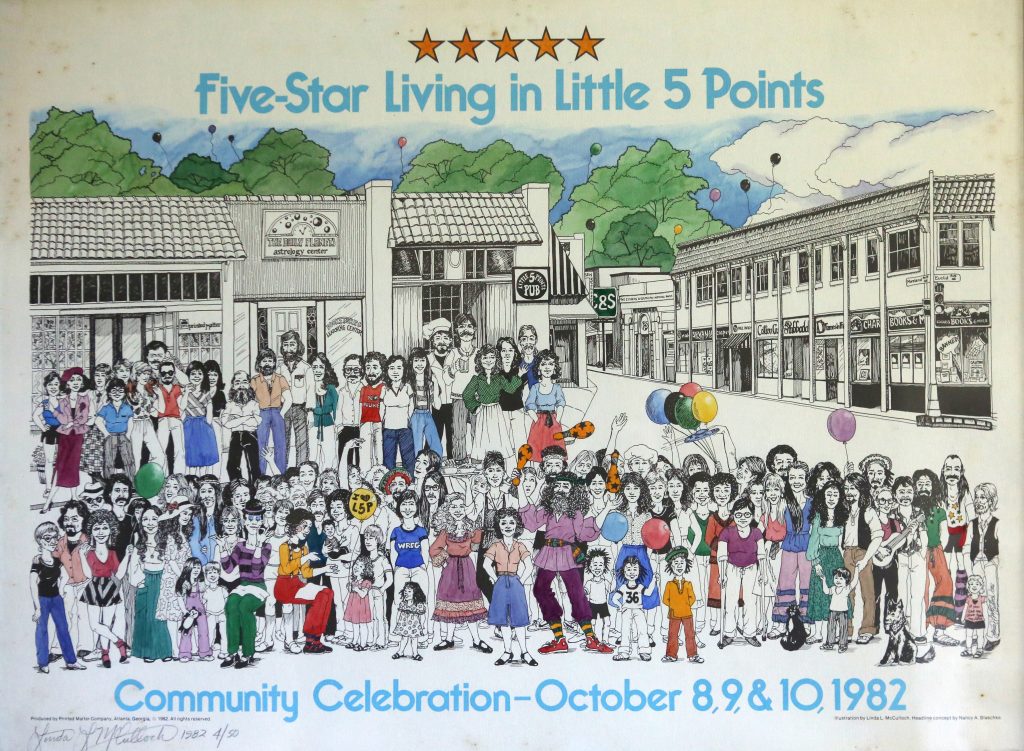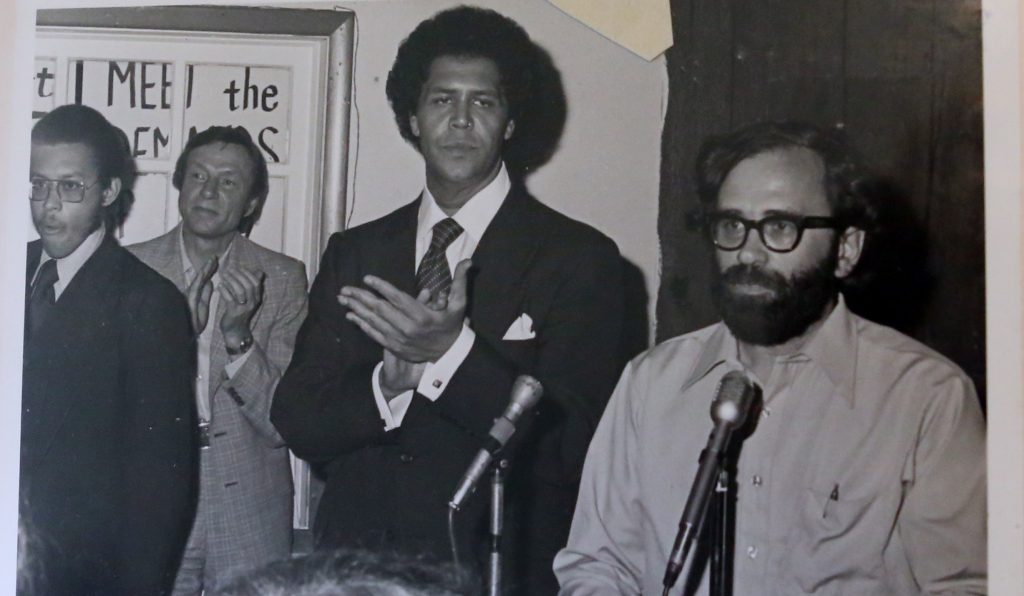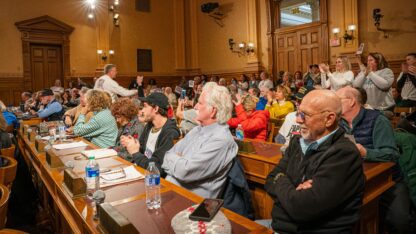On a warm spring day, Derek Cook rides his skateboard on the sidewalk outside Little Five Point’s most iconic strip. The one along Euclid Avenue with independent shops like Criminal Records and Southern Star Tattoo.
Cook said he just feels welcome here.
He’s been coming to the neighborhood for years. He’s in his 20s and sells his art on the street. He’s seen everyone from celebrities to tourists soak in the Little Five experience.
> Related: Meet The Generation Of Atlantans Who Helped Make Little Five Points What It Is Today

And that eccentric, counterculture vibe is there: in the brightly painted murals around the neighborhood and giant skull welcoming visitors into the Vortex Bar and Grill.
But, Little Five has also been an incredibly stable business district.
And it’s all because of a group of entrepreneurs and activists from the 1970s and ’80s who helped shape it into what it is today.

Even the neighborhood dentist, Dr. Richard Shapiro has been in business for 40 years.
After graduating from Emory, he was looking for a place to set up shop. When he first saw the building on Moreland Avenue, where he’s been in practice since 1979, he knew he found the right spot.
“It was falling down, you know, there was holes in the roof and the back wall was missing and there was squatters living there and there was water pouring in and I said, ‘I love it,’” he said.
Something about the variety of people living in the neighborhood at the time reminded him of his native New York.

“But it is a nice mix. You know you can see that there were students living around and the… Read More
“But it is a nice mix. You know you can see that there were students living around and there were artists around. It was all sorts of people of different ethnicities and different sexual orientations and different economic status. It was it was a really nice mix, again it reminded me New York. There was just a nice mix and it just spoke to me.” — Richard Shapiro
Around the time Shapiro opened his dental office in Little Five Points, other young professionals were opening businesses and buying homes.
People like Don Bender and his wife Judy. They moved to their home in Candler Park in the early ’70s and immediately got involved in the community.
Bender led a neighborhood effort to buy homes and fix them up.
But this neighborhood group wasn’t just flipping houses to make a dime. All the profits were used to buy the next property.

Eventually, they focused their efforts on commercial properties.
Including the infamous Redwood Lounge.
“It had the reputation of being the first place people would go to when they got out of jail,” Bender said.

He recalls more than one shooting taking place on the sidewalk outside.
But the neighbors turned it into a community pub. That was a big turning point.
It was now a place, where the likes of Maynard Jackson, Andrew Young and Jimmy Carter would appear.
Many residents in the neighborhood were savvy. When they needed something, they made it happen.
Kelly Jordan also settled in the neighborhood after graduating from Emory.

“But Little Five Points is a place I think everybody owns. For all its strangeness, I thin… Read More
“But Little Five Points is a place I think everybody owns. For all its strangeness, I think everybody’s welcome. You know you can you can come here and find something that you can relate to, I think, and I hope it keeps that.” — Kelly Jordan
He said Little Five Points is a story of people rolling up their sleeves and getting to work. And, when needed, defending their turf.
“Certainly part of the story is that Little Five Points had to fight to survive,” Jordan said.
Perhaps their biggest battle was to stop a proposed road expansion. Bender said the state planned to widen Moreland Avenue, which would have fundamentally changed the neighborhood.
“It had already been widened up to the heart of Little Five Points and then it would have continued, would have taken the pub and that whole section of buildings,” Bender said.
Their fight with the state lasted years. In many ways, it brought the neighbors closer together.

“You can still drive up and down the streets and they still look like the same streets …… Read More
“You can still drive up and down the streets and they still look like the same streets … Even as it has gentrified some and become more expensive to live in the area. There are a lot of people who have chosen to stay in the neighborhood.” — Linda Bryant
In the end, Little Five survived intact. It was because of efforts like that, from those who lived here in the ’70s and ’80s, that the neighborhood remains true to itself, authentic and a little off the wall.
Like the shop Crystal Blue. Which has been selling tarot cards, wind chimes and, of course, crystals since 1985. There’s Junkman’s Daughter, a quirky variety store, which opened in 1982.
And even though Charis Books & More recently found a new home in Decatur, it was a staple for more than four decades. Linda Bryant helped open the bookstore and still lives in the neighborhood.
“Even as it has gentrified some and become more expensive to live in the area. There are a lot of people who have chosen to stay in the neighborhood,” Bryant said.
And that includes relative newcomers like Caesar Ramirez. He’s lived in the area and has worked at Criminal Records since the early ’90s and he says, he’s not going anywhere.

“It’s real people doing real things and you know just the fact that you know we’re here … Read More
“It’s real people doing real things and you know just the fact that you know we’re here for the long haul, we’re not capitalizing on this being a trendy spot this is just kind of home.” — Caesar Ramirez









